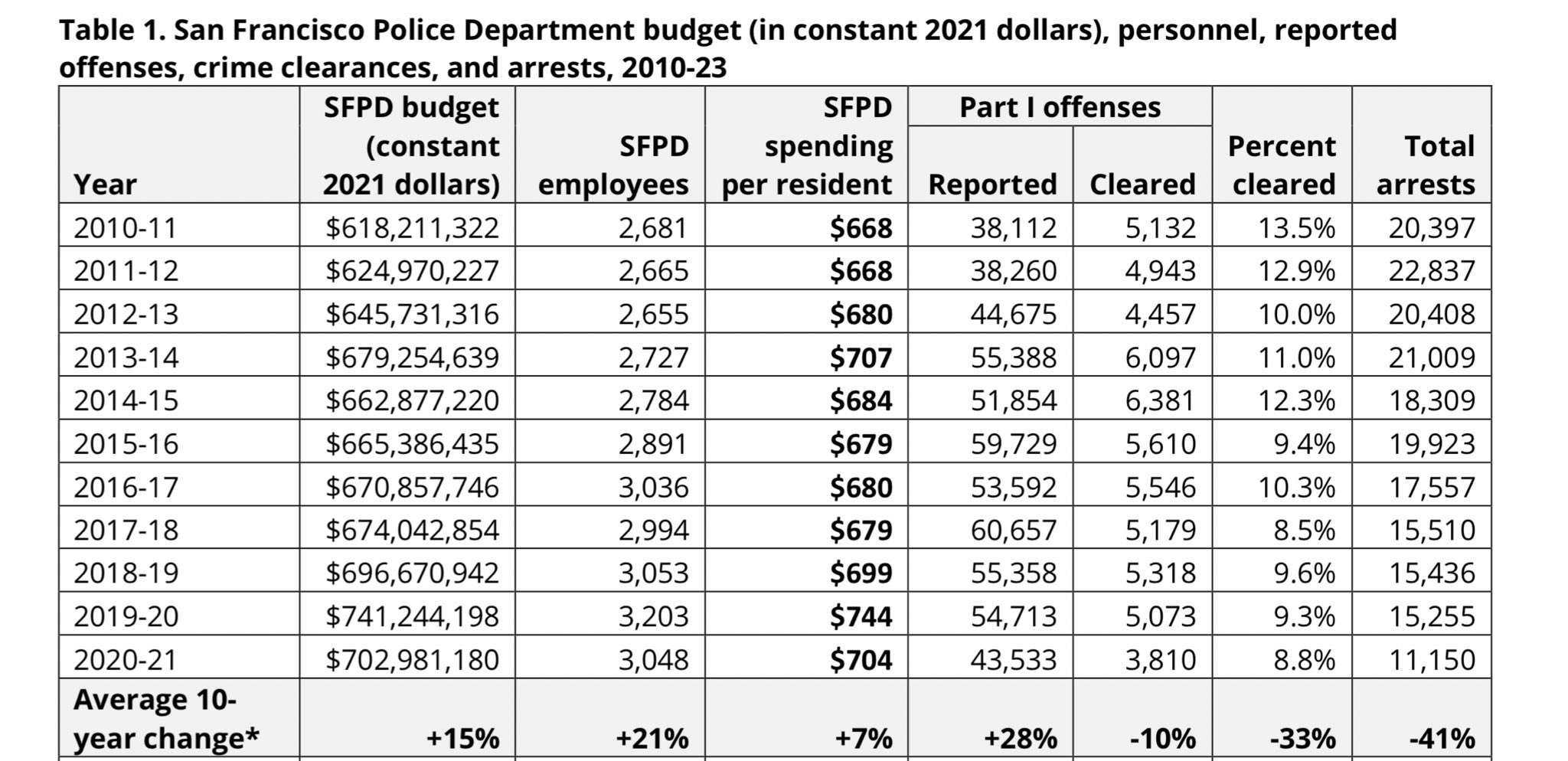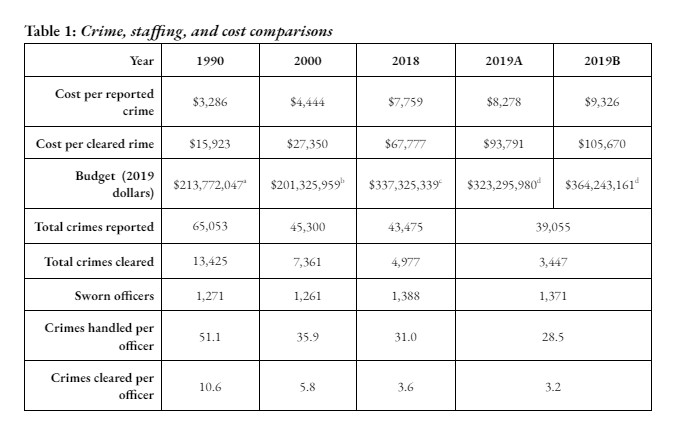Stumbled across this interesting rabbit hole on twitter.

Brian Kirschner did the math in constant 2019 numbers:

And, on traffic citations:
Statistically, SFPD have stopped enforcing traffic laws
In April 2014 they issued 11,000 tickets. In April of this year, only 350, a 97% decrease in 8 years
45 officers issue ~10 citations per day in total
This is not explained by COVID, they've simply stopped doing this work: pic.twitter.com/n1PiQ5wnxf
— Jake Moffatt (@jakeonrails) January 1, 2023
So, this interesting. There’s been a general collapse in clearance rates across the country, but when you look at them in detail you tend to see that police have basically stopped trying to clear crimes against blacks, and concentrate on crimes against whites.
But SFPD looks like more than that, it looks like refusal to work.
It’s an interesting situation. Part of it, I’m quite sure, is the way that police are trained to be scared. David Grossman (I’ve read his book “On Combat”) is famous for insisting that training must create instinctive killers who react without conscious thought. Police training is full of exercises which make cops scared of the public.
…officers are afraid of being injured or killed because their jobs are dangerous, but data show that being a police officer is relatively safe. Law enforcement doesn’t crack the top-15 list of most dangerous jobs in America, according to the Bureau of Labor Statistics.
…“A lot of research shows that what people think is dangerous and what they believe poses the greatest risk of harm is determined by your membership in various social groups,” Arsiniega says. This is a phenomenon called “social amplification.” Police may believe they are at a great risk of civilian assault, even when empirical data say otherwise…
…
Mixing systemic racism and socially amplified fear of assault becomes deadly because police are armed, and they have “legal justification to kill people and be legally excused if they’re protecting their lives or lives of a third party,” Arsiniega says.
However, in more than 90 percent of cases in which an officer kills a civilian – about 1,000 each year in America – officers claim to be protecting themselves, not a third party.
Neither do the majority of injuries to on-duty officers come from civilians.
For her dissertation at the University of California at Berkeley, Arsiniega studied police officer injury data from all causes in Savannah, Georgia, between 2010 and 2018. Only 11 percent of all officer injuries were the result of civilian assaults.
She also studied assaults on Atlanta Police Department officers from 2015 to 2018 using reports written by officers themselves. Despite having a violent crime rate roughly 2.5-times the national average, not a single officer was shot or stabbed in the years of her sample. The most serious injuries caused by civilians were broken bones in the hand and cuts and scrapes on officers’ hands and knees while arresting suspects.
Cops are basically immune to prosecution for violent crimes against civilians. There are exceptions, but they’re exceptions. They aren’t actually doing a particularly dangerous job: being a logger or a fisherman is way more dangerous, but they think they are, and they have an ethos of “us versus them.”
But their training emphasizes that is “better to be judged by twelve, than carried by six”. They are more concerned about their safety than the safety of others, they don’t “protect and serve” civilians, they protect and serve themselves.
This feeling of being a beleaguered group, under great danger, probably contributes to refusal to work. They show up, but they don’t take anything they perceive as risks.
There is also a sense that they aren’t appreciated, a “we risk our lives and you look down on us and don’t treat us like heroes” and that also, I’m sure contributes to a sense that they don’t owe it to the public to do their jobs. After all, money isn’t worth their lives.
But basically, being a cop is close to being a sinecure at this point. They are mostly immune to prosecution, they are paid very well for municipal workers, and police budgets in most cities keep rising and are often the largest part of the city budget. It’s a union job in the worst sense of the word: a job where there is no real accountability to actually do the job, and it is cushioned by the high respect that most white Americans have in the police.
Sixty-nine percent of Americans trust local police and law enforcement to promote justice and equal treatment for people of all races (up from 56%), and 52% feel the same about police unions (up from 40%).
Since clearance rates have been declining for decades and since the response to that has been to increase budgets, there really is no reason for police to do their jobs. In fact, not doing their jobs is probably the strategy that works best: it’s easier, they get to say crime is out of control and claim that more money is needed.
If not doing your job leads to more money not less, why do your job, especially when you’ve been trained to think it’s a dangerous job, when being a policeman isn’t even as dangerous as being a farmer, logger, or fisherman.
My ability to write these articles depends on donors and subscribers so if you value this writing, please DONATE or SUBSCRIBE
